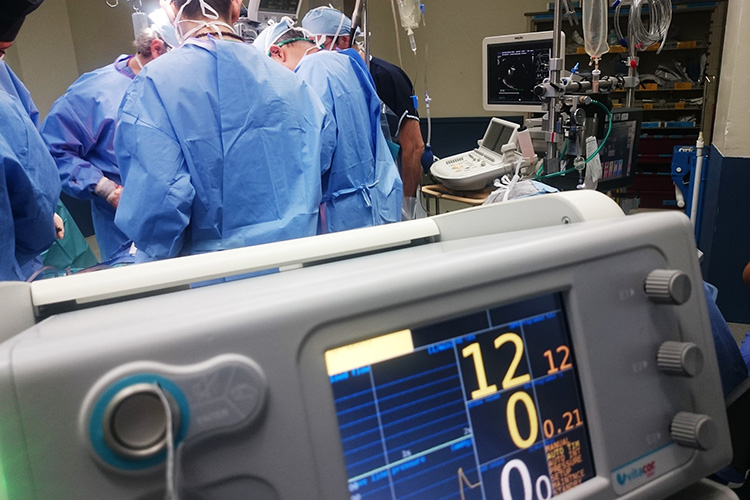As religious institutions dedicated to health care, and always committed to the care of people at the end of their lives, or of those with serious disabilities and limitations, religious of Spain and Catholic health institutions have presented a joint manifesto with which they position themselves against the Euthanasia Law in a forceful way.
In addition to refusing to hasten death and declaring that they are not willing to inflict it on anyone, they point out that "facilitating a suicidal action or a homicidal action, even if this situation is requested and accepted by the person concerned, is a mistake, because it is a disregard for human dignity, since it suppresses the person at the hands of other people".
In a ceremony held at the San Camilo Center in Tres Cantos and broadcast on YouTube, they expressed their commitment to the relief of suffering and the care of life, and stated that they defend "life as a good and a fundamental value on which the person is based, so respect for it is essential", and also "to make possible a peaceful social coexistence. No one is morally legitimized to suppress or provoke the death of a fellow human being".
With respect for human dignity, the signatories of the Manifesto demand that life and personal integrity should not be harmed, but that life should be promoted and cared for, acting to alleviate suffering. In this context, correctly indicated palliative sedation, when other measures are not effective, and administered with the patient's prior consent, respects and humanizes the end-of-life process by mitigating intense and incoercible suffering.
Commitment to humanization
In the manifesto, they state that society can make it possible for people with fragile or very limited lives to be integrated and welcomed, by dedicating sufficient health and social resources to make it possible to deal with these situations. To this end, they offer their commitment to humanizing the care of people's lives without seeking to lengthen or shorten them irresponsibly.
The day began with the lecture "Caring at the end. Ethical Positioning, given by José María Galán González-Serna, internist and member of the San Juan de Dios Health Care Ethics Committee. Afterwards, Brothers Amador Fernández, Provincial of the Brothers of St. John of God, José Carlos Bermejo, General Delegate of the Camillian Religious, and Juan Vela, president of LARES Federation, gave a speech. Then, Olga Ginés, president of Catholic Hospitals, and Rosa Abad, responsible for the Social and Health area of CONFER, took the floor and Cristina Muñoz, responsible for the formation of the Center for Humanization (humanizar.es) moderated the event, which was conducted by Cristina Muñoz.
Fear of a throwaway culture
As general delegate of the Camillian Religious, "committed to a dignified death for more than 400 years," José Carlos Bermejo promoted adherence to the manifesto. "We fear that the euthanasia law will discourage people who need care to live with dignity and meaning; that spurious interests will generate a demand for help or the execution of euthanasia; that it will reduce the social commitment to overcome unwanted loneliness and dignified care in dependency, as well as indiscriminate practices of improper sedation. In short, we fear a culture of discarding suffering and dying". "One does not die with dignity only when one decides when," he added.
For this reason, Bermejo stressed that the San Camilo Center has included in its Code of Ethics the rejection of any euthanasia approach: "As an institution belonging to the Catholic Church, we follow its moral guidelines and we are committed to caring for and accompanying people at the end of life and their loved ones. Therefore, they offer comprehensive and holistic accompaniment, respecting the advance directives of the patients. This is a commitment shared by the Hospitaller Order of St. John of God, a leader in palliative and chronic care in Spain for more than 30 years.
Palliative Care
Previously, the director of the Ethics Department at San Juan de Dios, José María Galán, explained that "we perceive a growing social sensitivity to suffering at the end of life and we want to publicly express that we remain committed to the alleviation of human pain and suffering, offering the effective application of high quality Palliative Care that, at the same time, respects life without causing death. We are confident that our ability to welcome, accompany and care for people in the final stages of life will alleviate their suffering. And we stand in solidarity with them through our Hospitality to help them face the last period of their life, which can be experienced as the most difficult to live".
"There is no pain meter," noted José María Galán, "and the one who asks for help can be called into question. It is difficult to measure the intensity of pain. For this reason, it is necessary "to be trained in the treatment of pain and suffering, and also in psycho-spiritual care, which is the weakest".
Regarding the euthanasia law coming into force in Spain, Galán pointed out that "it has conceptual errors, false assumptions and dangerous consequences". He stated that "causing death is not a natural act", that "compassion should not suppress life", that "palliative care alleviates suffering and avoids despair", and that "causing death should continue to be prohibited".
Finally, Rosa Abad, from CONFER, emphasized "the dignity of the human being", spoke of integral Palliative Care, and encouraged "to care when it is no longer possible to cure".









